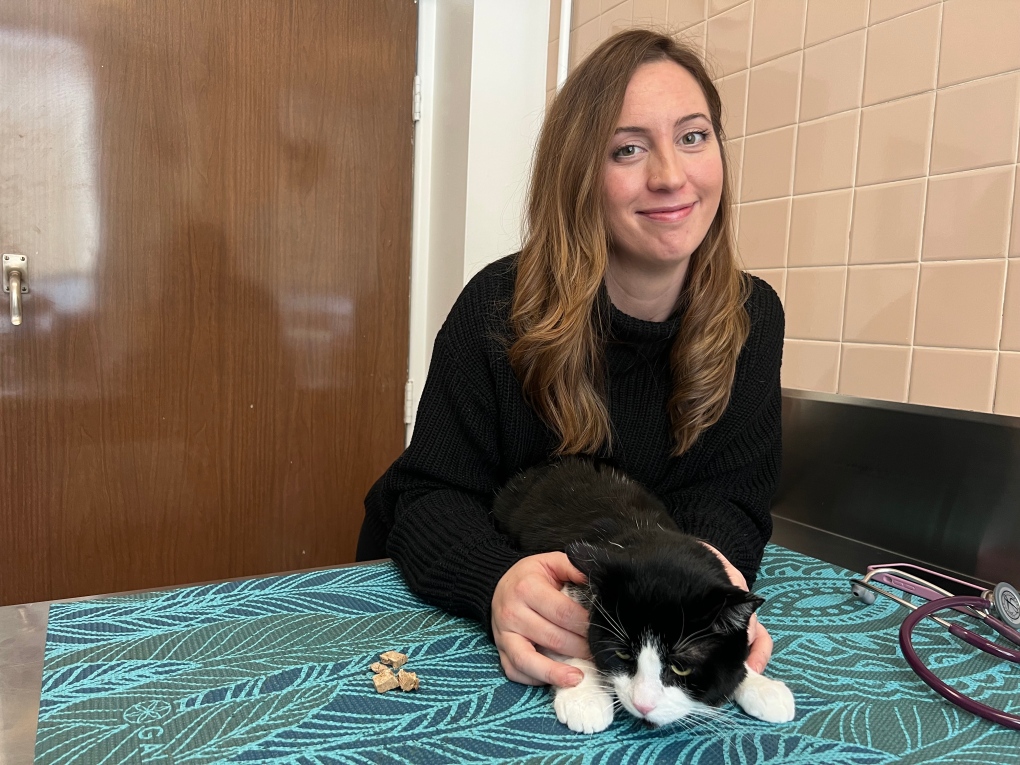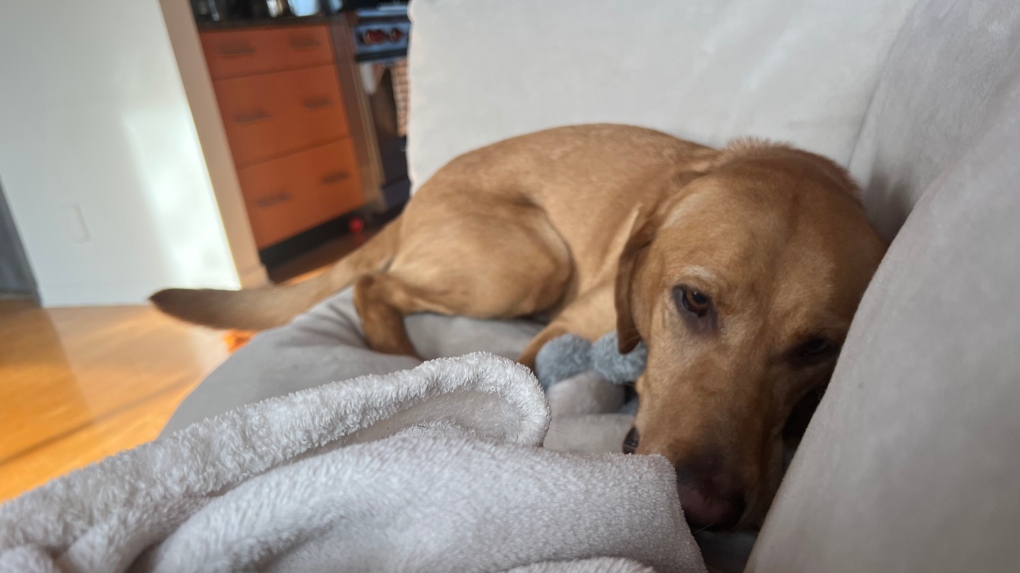'He was very close to dying': Dog owner calls for Quebec ban on leg hold traps
After his beloved dog Che's snout was caught in a leg hold trap, Montrealer Frederic Berard started a campaign urging Quebec to heavily restrict or even ban their use.
"Che was having a walk as always at my chalet, and he got trapped," said the constitutional lawyer. "I would say he was very close to dying because those are instruments to kill an animal, obviously."
When Berard posted the account of his dog's injury on Facebook, other pet owners began sharing their equally troubling stories.
"I received so many testimonies mentioning the same story again and again and again, and I realized it's not an anecdote, it's a phenomenon and we need to regulate that to stop that," said Berard. "In 2023, we're better than that in Quebec."
The "Boycottons SAIL, CANAC et Latulippe qui vendent des pieges!" change.org petition has garnered over 2,300 signatures, calling leg hold traps "cruel" and "without pity" for animals that get caught in them.
The group on Facebook would like much stricter regulations or even a prohibition of leg hold traps outside of traditional Indigenous trapping, which the group acknowledges is done with expertise and compassion.
To trap in Quebec, you must be 12 years old, have taken a training course and have a licence. You can then trap on public land so long as you don't use traps with teeth, hooks, claws or barbed wire.
Trappers are not required to post signage warning people that traps are near or to check their traps daily.
"So there's a story of a dog that had to stay there for nine days," said Berard.
NON-TARGET ANIMALS CAUGHT
An American Veterinary Medical Association report in 2008 found that as many as 67 per cent of animals caught in traps are not the ones the trapper intended to catch.
"Surveys of endangered animals such as flightless birds sometimes record high levels of trap injury," the report reads. "Non-target animals can be released from leg hold traps, but their survival may be impaired. More severe injuries may also result with multiple captures of the same animal in catch-and-release situations."
In Quebec, trappers who catch a non-target animal must report it, but only if it is on the "Animals that must be declared list," including black bears, grey foxes, polar bears or wild turkeys.
Pets are not on the list.
DAMAGE TO PETS AND PET PARENTS
The damage done to animals caught in traps is often severe.
"We've seen animals come in with muscle tears through their legs, and we've had to try to suture them back together," said animal health technician Alexandra Yaksich. "We've seen animals come in that have been in these traps for days at a time, so they start to get very serious bacterial infections in their paws and going up their arms, and sometimes the only thing you can do in that case is amputate the arm."
Yaksich said the physical damage to the pet is written all over the face of the pet's owners.
"Often, the witnessing of such horrific images, especially when it's your own animal, to see muscle exposed, lots of blood, that's very traumatizing," she said. "Often we hear from clients that they have dreams about it, and they're still thinking about it years after it happened."
 Animal health technician Alexandra Yaksich treats Poe, and hopes that one day leg hold traps will will be banned. (Daniel J. Rowe/CTV News)
Animal health technician Alexandra Yaksich treats Poe, and hopes that one day leg hold traps will will be banned. (Daniel J. Rowe/CTV News)
In addition to seeing a family pet injured, owners also have to make a decision of whether to pay costly vet bills or put the animal down.
The pricey vet bill is even harder to swallow for some when they learn that traps are relatively inexpensive.
The leg hold trap that caught Berard's dog Che cost about $25 online.
If that same trap had caught his other dog Lenin or a smaller animal such as a cat, it likely would have died.
"We're very lucky that he's a tough cookie because most of the time, dogs like that just die right away," said Berard.
 Che still has the scars from when a leg hold trap snapped across his snout. (Daniel J. Rowe/CTV News)
Che still has the scars from when a leg hold trap snapped across his snout. (Daniel J. Rowe/CTV News)
CTVNews.ca Top Stories

opinion Tom Mulcair: Prime Minister Justin Trudeau's train wreck of a final act
In his latest column for CTVNews.ca, former NDP leader and political analyst Tom Mulcair puts a spotlight on the 'spectacular failure' of Prime Minister Justin Trudeau's final act on the political stage.
B.C. mayor gets calls from across Canada about 'crazy' plan to recruit doctors
A British Columbia community's "out-of-the-box" plan to ease its family doctor shortage by hiring physicians as city employees is sparking interest from across Canada, says Colwood Mayor Doug Kobayashi.
'There’s no support': Domestic abuse survivor shares difficulties leaving her relationship
An Edmonton woman who tried to flee an abusive relationship ended up back where she started in part due to a lack of shelter space.
Baseball Hall of Famer Rickey Henderson dead at 65, reports say
Rickey Henderson, a Baseball Hall of Famer and Major League Baseball’s all-time stolen bases leader, is dead at 65, according to multiple reports.
Oysters distributed in B.C., Alberta, Ontario recalled for norovirus contamination
The Canadian Food Inspection Agency has issued a recall due to possible norovirus contamination of certain oysters distributed in British Columbia, Alberta and Ontario.
Arizona third-grader saves choking friend
An Arizona third-grader is being recognized by his local fire department after saving a friend from choking.
Blake Lively accuses 'It Ends With Us' director Justin Baldoni of harassment and smear campaign
Blake Lively has accused her 'It Ends With Us' director and co-star Justin Baldoni of sexual harassment on the set of the movie and a subsequent effort to “destroy' her reputation in a legal complaint.
New rules clarify when travellers are compensated for flight disruptions
The federal government is proposing new rules surrounding airlines' obligations to travellers whose flights are disrupted, even when delays or cancellations are caused by an "exceptional circumstance" outside of carriers' control.
Germans mourn the 5 killed and 200 injured in the apparent attack on a Christmas market
Germans on Saturday mourned the victims of an apparent attack in which authorities say a doctor drove into a busy outdoor Christmas market, killing five people, injuring 200 others and shaking the public’s sense of security at what would otherwise be a time of joy and wonder.


































